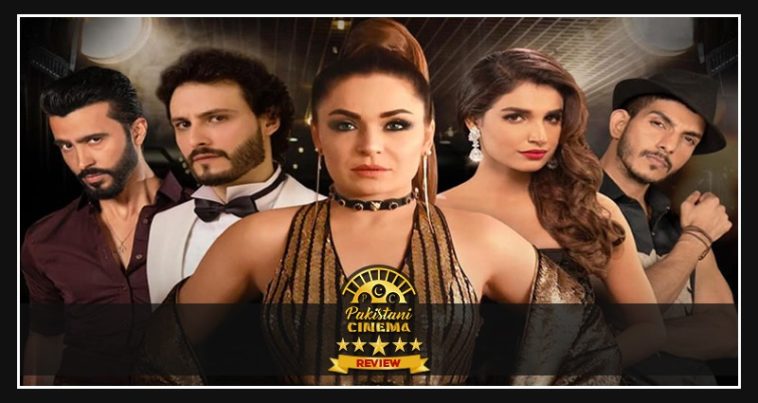During Zeb Bangash’s performance of ‘Shaam Nasheeli Hai’, Shameera (Meera) and Rohail Khan (Osman Khalid Butt) are dancing in a ballroom surrounded by the old and the new faces of Pakistani cinema. Actors, photographers, singers and all. That scene summarizes Baaji incredibly well. It’s old Lollywood and the new wave of Pakistan cinema coming together. While other films from this new wave have brought young talent and veterans together, none have seemed as authentic and unpretentious as “Baaji”.
From Nayyer Ejaz as Kamaal Chand, the sleazy talent agent and veteran Nisho as Shameera’s mother-like figure, Dilshad Bano, to Amna Ilyas as the impressionable Neha and Ali Kazmi as Shameera’s jealous ex lover Ramiz Aslam, everyone is on top of their game. No one falters or overacts. They deliver their lines as authentically as possible and even in situations that require melodrama, no one comes off as excessive or pretentious.
However, no one is as good as Meera. This isn’t just because the limelight is hers for most of the movie or because she’s the film’s main protagonist. It’s just because this is a role she was born to play. The film and her character, Shameera, mirror her real life to the extent that a few key moments in the film can be traced back to her good and ill fortunes. Even when Meera has to deliver ‘filmy’ dialogue, the conviction with which she pulls it off makes you smile. And it’s that confidence and effortlessness that places Meera above each and every one of her co-stars in the film. No matter how good anyone else is, when Meera enters the frame, all eyes are on her.
In an interview with PakistaniCinema.Net, Osman Khalid Butt said that Meera was the perfect choice for the ‘Classic Chehra’ that his character, Rohail Khan, is looking for in the film. A classic face was one that could be smoldering and innocent at the same time, fierce as well as vulnerable. In Baaji, Meera is all that, and more. Love, fear, ferocity, hate, madness and jealousy; Meera sells it all. Perhaps it’s because everyone is so familiar with her persona that none of it comes off as forced or hammy, or perhaps because she’s just a good aactress that all of it seems authentic. Whatever the case may be, Meera is excellent. And so, everyone else can’t help but pale in comparison.
Films like Baaji make you wonder whether better direction, more maturity and a greater sense of realism, could’ve brought forth powerhouse performances from actors like Meera in their prime in the 1990s. For me, the answer is invariably yes.
Saqib Malik’s direction has to be praised as well. He had said on record that he could never make a film like this again because the entire project was so exhausting. And it shows. The cinematography, the editing, the choreography, and the performances are all on point.
The music is as crisp as the images on screen, with the voices of Zeb Bangash, Aima Baig and Sunidhi Chauhan resonate throughout the film and the peppy dance number “Khilti Kali” which is a remixed version of the original club song from the 70s, visibly got the theater excited. This is a film made to technical perfection. Whatever faults you have with the film, you won’t be able to say that it wasn’t shot well.
However, that brings us to the flaws with the film, and they’re too prominent to brush under the table. The first is the dialogue. Irfan Ahmed Urfi’s dialogue is clichéd in many places and reminds us of lines that we’ve heard a million times before. At times, even the capable talent on screen struggles to deliver them effectively. The two people that completely sell every line that they’ve spoken are Meera and Nayyer Ejaz. And that’s because they’ve mastered every inflection and tone needed to deliver any sort of dialogue thrown their way.
The second is the ending of the film. The climax comes so out of left field that you sit there flabbergasted at what has transpired, and not in a good way. This is not to say that taking risks with films and encouraging new ideas is a bad thing, but when twists and plot elements are introduced in to stories without much justification and even betray the story in some ways, then they have to be criticized.
However, despite the shock ending, people leaving the theater were exclaiming that the film was an entertaining experience. And we couldn’t agree more.
“Baaji” is a film that is completely dependent upon its performances and for that it gets top marks. We get so many films in Pakistani cinema that are hits because of their patriotism fueled stories and entertainment value or even their action sequences. Baaji may be the first in a long time to win on merit of performances alone.
Baaji Movie Review
-
Verdict
Summary
We get so many films in Pakistani cinema that are hits because of their patriotism fueled stories and entertainment value or even their action sequences. ‘Baaji’ may be the first in a long time to win on merit of performances alone.



Comments
0 comments